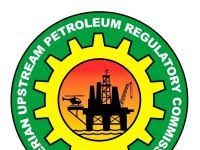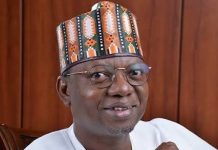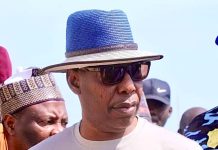By Salimonu Kadiri
In The Guardian Nigeria, the article titled, Nigeria’s new drive to industrialisation, the writer Mr. Matthew Agboma Ozah wrote, “For the better part of the life of this government, it is interesting to note that just about two years to the end of his administration, President Muhammadu Buhari’s government now suddenly realised that gas, a commodity that has been flared recklessly in the Niger Delta region for decades, is now crucial and economically viable.”
It is not true to assert that President Buhari now realises that gas is now crucial and economically viable to Nigeria, since President Umaru Musa Yar’Adua had discovered that in 2008. At that time, gas flaring filled the air with toxic fumes in the Niger Delta, causing people with respiratory disease and cancer. Part of the toxic fumes fell as acid rain damaging crops and aluminium roofs on houses. Consequently, President Yar’Adua’s government decided in 2008 to end gas flaring by utilising oil-field gas to generate electricity.
A company that was given concession in 2010 was Process and Industrial Development Ltd (P & ID) that was registered in the British Virgin Islands but with no website or track records. The chairman of P & I. D. Ltd., was Michael ‘Mick’ Quinn, a 68-year-old Irishman who had had decades of experience in Nigeria as a military contractor. Mr. Quinn died of cancer in 2015, but before his death he had secured a nine billion dollars ($9 billion) award from United Kingdom Court of Arbitration against Nigeria in June 2014 for allegedly breaching the 2010 gas contract with P & I. D. Ltd. It was when Mr. Quinn’s associate, Mr Bredan Cahill, and others, many of whom were Nigerians wanted to enforce the UK’s Arbitration order to force the Nigerian government to pay the $9 billion that the EFCC under Mr. Ibrahim Magu and 12 of his colleagues now suspended under dubious circumstances, began investigation of the Gas Contract with P & I. D. Ltd.
And what qualified Mr. Michael ‘Mick’ Quinn to obtain gas supply contract to generate electricity in Nigeria? Magu’s investigation revealed that Mr. Quinn was an Irish auto mechanic who later started managing music bands and later transformed into a commodity trader. Mr. Quinn was actually brought to Nigeria by A retired Army General. However, the former Irish auto mechanic turned Consultant, Michael ‘Mick’ Quinn, seized the gas flaring project, applying for the contract in the name of his own company, Process and Industrial Development (P & ID) Limited. Magu’s EFCC discovered that the Executive, Legislature, and the Judiciary in collaboration with Mr. Michael ‘Mick’ Quinn, have been engaged in racketeering that encompassed the making of artificially engineered and factored breaches of contracts. Quinn, with the support of Nigerian officials and lawyers had been involved in regular and elaborate court cases/arbitrations in which Nigeria had paid millions of dollars shared between Mr. Quinn and his Nigerian collaborators. However, Mr. Quinn saw to it that the gas supply processing agreement which P & I. D., and Nigeria signed in 2010 contained a clause that arbitration for the breach of the agreement could be decided by a UK court of arbitration and not necessarily by a Nigerian court.
Thanks to investigation by Magu and his 12 suspended colleagues, the 2014 UK arbitration decision against Nigeria was annulled by the UK Court of Appeal in 2020. As it is narrated above, Mr. Quinn had already secured arbitration judgment in his company’s (P & I. D.), favour in June 2014 when Jonathan was the President which Buhari’s government inherited in 2015. Thanks to the effort of Bredan Cahill, Quinn’s associate and others, to get the arbitration money paid by Nigerian government, Buhari became aware of gas flaring in the Niger Delta, which Yar’Adua had intended to utilise for generating electricity. Gas as a means of generating electricity is actually not Nigeria’s new drive to industrialisation but one of many decades of carried forward industrial development projects under various governments in Nigeria both at national, state and local government levels. However, the main question in this case of gas for electricity is, how was it possible for an Irish former auto mechanic and music band manager to obtain contract for the exploitation and supply of Nigeria’s gas to generate electricity, in spite of availability of all kinds of educated Professors in Nigeria?
While discussing with a comrade of mine, an aborigine, from the crude oil producing Niger Delta recently on the $1.5 billion to be expended on Turn Around Maintenance of Port Harcourt oil refinery, he complained about the lop-sidedness of Buhari’s appointments in favour of Northerners and Muslims. He forwarded to me a list of 20 Nigerian National Petroleum Corporation (NNPC) top executive position holders to support his charge against Buhari. Here follows the list he posted to me :
1. Mele Kyari – Group Managing Director (GMD).
2. Umar Ajiya – Chief Finance Officer/ Finance and Accounts.
3. Yusuf Usman – Chief Operating Officer.
4. Farouk Garba Sa’id – Chief Operating Officer, Corporate Services.
5. Mustapha Yakubu – Chief Operating Officer, Refining and Petrochemicals.
6. Hadiza Coomassie – Corporate Secretary/legal Adviser to the Corporation.
7. Omar Ibrahim – Group General Manager, International Energy Relations.
8. Kallamu Abdullahi – GGM Renewable Energy.
9. Ibrahim Birma – GGM Governance Risk and Compliance.
10. Bala Wunti – GGM NAPIMS.
11. Inuwa Waya – MD NNPC Shipping.
12. Musa Lawan – MD Pipelines and Product Marketing.
13. Mansur Sambo – MD Nigeria Petroleum Development Company.
14. Lawal Sade – MD Duke Oil/NNPC Trading Company.
15. Malami Shehu – Port Harcourt Refining Company.
16. Muhammed Abah – MD Warri Refining & Petrochemical Company.
17. Abdulkadir Ahmed – MD Nigeria Gas Marketing Company.
18. Salihu Jamari – MD Nigeria Gas and Power Investment Company Limited.
19. Mohammed Zango – MD NNPC Medical Services.
20. Sarki Auwalu – Director Department of Petroleum Resources.
Although I have not been able to verify the truthfulness of the above list, I asked my friend if crude oil exploration and refinery are conducted with knowledge or with ethnicity and religion? As he stuttered in answering my question, I asked him, in particular, if the inability of the personnel at Nigeria’s oil refineries to refine crude oil depends on their religion and ethnicity or lack of knowledge of how crude oil is refined? It might be likely that lack of knowledge is responsible, he answered. My point is that instead of focusing on the religion and ethnicity of public officials, Nigerians should be querying the competence of public office holders who have failed to produce as required of their offices. As we have seen in the Nigerian oil refineries, and in fact all Nigeria’s industrial establishments, it is easy for a home cat to wear the fur of a tiger, but to prey like a tiger is impossible. Nigeria’s industrialisation will continue to be a dream as long as we priotise ethnicity and religion before knowledge and merit.
Kadiri wrote from U.S.A.













